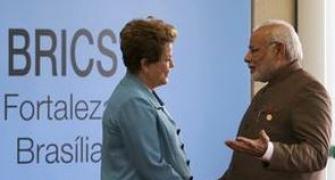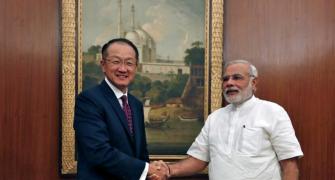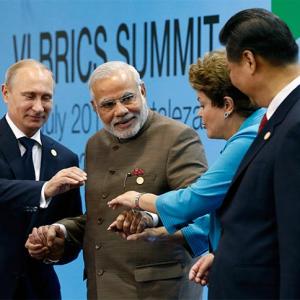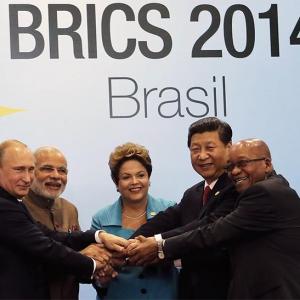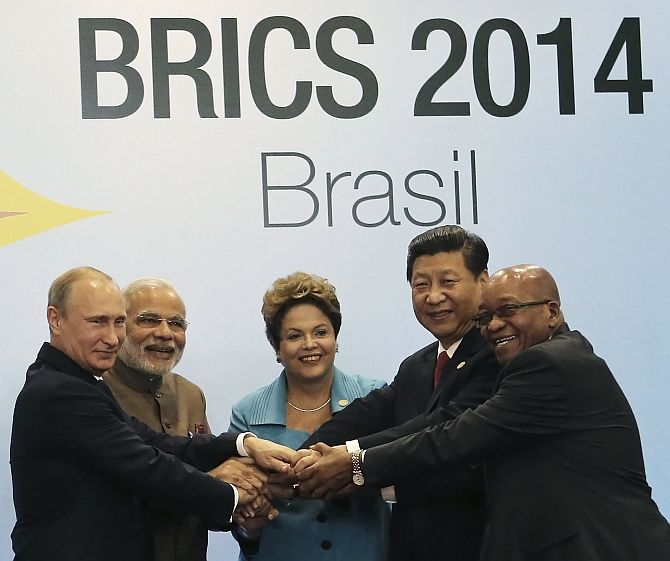 The BRICS model will need to demonstrate the efficacy of a second alternative governance structure to reform the Bretton Woods legacy, says Zorawar Daulet Singh.
The BRICS model will need to demonstrate the efficacy of a second alternative governance structure to reform the Bretton Woods legacy, says Zorawar Daulet Singh.
It has become customary for some Indian analysts to deride multilateral networks that haven't emerged from the Bretton Woods womb. Brazil, Russia, India, China and South Africa (BRICS) invites particular scorn.
But if Indian elites can get over their prejudices, they will discover that BRICS is fuelled by both a normative impulse to buttress national identities and an instrumental strategy to reverse the north-south divide.
What is often missing in the post-Cold War discourse is that unipolarity and neoliberal globalisation was an internationalist phenomenon that sought to subsume rising power identities and nationalisms.
The geopolitical and geoeconomic tumult over the past decade, however, has re-opened an identity challenge for rising powers. The question of where these states fit in the global system is again becoming relevant.
As long as the Bretton Woods order could cede space and sustain the aspirations of its new entrants, this identity problem could be and was set aside in favour of international integration by the rising powers.
But with the decline in America's capacity and leadership and consequent inability to co-opt non-western states into the old order, rising powers are re-asserting their national identities. As they reset their equations with the West, it is not surprising that BRICS states have found friction with the US, albeit in different degrees.
BRICS is one platform for its members to project their distinct national identities and roles on a global stage without the pressures of socialisation and conformity that engagement within western-dominated institutions typically entails.
But BRICS is also driven by instrumental reasons. For many, an anti-BRICS posture is essentially "a cut India's nose to spite China's face" argument.
To be sure, there are challenges such as preventing a capital-surplus China from throwing its weight about in BRICS institutions.
While the norm of equality has been established as a conscious antithesis to the hierarchical Bretton Woods norms, it is worth exploring why China is accepting an egalitarian approach to governance.
Ironically, there is some similarity between China's approach to BRICS and US policies in shaping the post-1945 economic order.
After the Second World War, the US emerged as a capital-surplus country with massive financial claims on the ravaged but then still industrially advanced Western Europe. The US invested in institutions to share power and decision-making authority with its former economic rivals to forge a rule-based economic community.
While the destructive war that produced the extraordinary asymmetry between America and the rest of the world after 1945 is not valid in today's context, the logic for stronger rising powers such as China to initiate a similar process of sharing power and authority to create durable institutions exists.
While it is unclear if China has acquired a sophisticated internationalist vision, it is finding it beneficial to invest in institutions where its relative financial prowess may not yield immediate national pay-offs. After all, other rising powers are only buying into this process because it is based on "democratic governance structures".
For some this is a mere temporary expedience before China reverts to traditional geopolitical behaviour by steering BRICS into a Chinese handmaiden.
But this argument presumes BRICS minus China is doomed to fail and Brasilia, Moscow and Delhi lack the agency and skill to shape their destinies and defend the shared norms that underpin BRICS.
An optimal path for BRICS would be that Bretton Woods institutions gradually recognise their folly and seek to create a genuinely reflective and responsive governance system.
Here BRICS would be the ideal partner and vehicle to bridge the western and non-western worlds, and, the north and south.
Paradoxically, it is BRICS' success that might change western attitudes to global governance. Plainly put, BRICS will need to demonstrate the efficacy of a second alternative governance structure to reform the dominant one.
But to influence global governance, BRICS needs to articulate their development norms and construct institutions that reflect these norms.
According to World Bank data, developing countries now trade more with each other than with the advanced economies. China has played a central role in this expansion of south-south trade. But it has also produced imbalances.
Although China runs surpluses with all its BRICS partners, Russia and Brazil as mineral-, commodity- and energy-rich exporters can compensate for inward Chinese manufacturing.
India's problem is unique in that it lacks surplus natural resources to pay for its China imports.
It also lacks manufacturing depth with the lowest share of manufacturing-gross domestic product ratio among emerging economies at 16 per cent.
Until the global economic crisis, India was walking a tightrope by absorbing large capital inflows to pay for its industrial imports. As easy money dried up, and, India's domestic savings proved inadequate to sustain the state and private sectors, India's structural problems have become all too apparent.
The New Development Bank offers an ambitious solution. Since the heart of the problem is the asymmetry in supply-side manufacturing capabilities between the BRICS economies, the bank will "mobilise resources for infrastructure and sustainable development projects in BRICS and other emerging economies".
Stephany Griffith-Jones of ColumbiaUniversity argues, "the BRICS bank will mark a significant shift in the international development finance architecture." She estimates that in two decades the Development Bank could reach a "stock of loans of up to US$350 billion," exceeding World Bank finance.
If India can leverage the global power transition to potentially increase its developmental options, why should it squander that opportunity?
Jim O'Neill, who dreamt up the acronym BRIC, recently admitted, "I never dreamed they would get together as a political group". Whether centrifugal contradictions will get the better of this collectivist endeavour is contingent on several factors but perhaps primarily on the evolution in world politics. But let's not game this before it happens.
The trend lines are for an interdependent but chaotic multipolar world, not a Sino-centric Middle Kingdom. For a world deprived of governance, BRICS might just supply some order.
The writer is a foreign affairs analyst and a doctoral candidate at King's College London.


